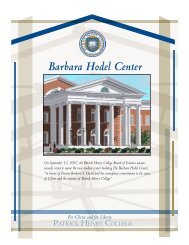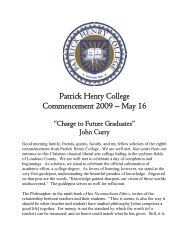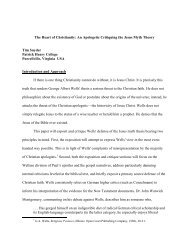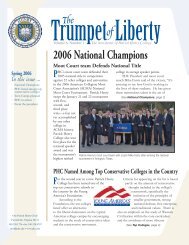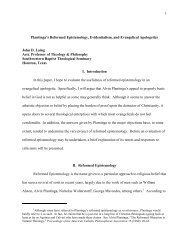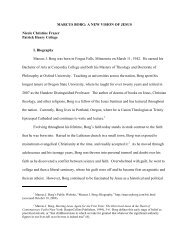Grateful Creatures, Ungrateful Gods - Patrick Henry College
Grateful Creatures, Ungrateful Gods - Patrick Henry College
Grateful Creatures, Ungrateful Gods - Patrick Henry College
Create successful ePaper yourself
Turn your PDF publications into a flip-book with our unique Google optimized e-Paper software.
<strong>Grateful</strong> <strong>Creatures</strong>, <strong>Ungrateful</strong> <strong>Gods</strong><br />
Mark T. Mitchell<br />
Faith & Reason Lecture<br />
<strong>Patrick</strong> <strong>Henry</strong> <strong>College</strong><br />
September 18, 2009<br />
Defining a Concept<br />
During the next hour, I want to consider the role gratitude plays in the way we<br />
live our lives both individually and corporately. I want to consider the ways that an<br />
underlying sense of gratitude might affect how we approach politics, how we behave<br />
ourselves in relation to the natural world, and how we conceive of education. But at the<br />
same time, we need to speak about ingratitude, for, and I am not the first to observe this,<br />
we tend to be an ungrateful lot. In 1930, the Spanish philosopher, Jose Ortega y Gasset<br />
observed that modern people are, among other things, characterized by their “radical<br />
ingratitude.” This claim does, of course, need defending, and I can imagine the objections<br />
from a variety of quarters. When we speak of gratitude, there will be those who think<br />
primarily of etiquette: “I taught my children to say please and thank you and they usually<br />
do.” There will be those who think in personal terms: “I have a nice house, a new car, and<br />
a boat. Sure, I’m grateful.” Or there will be those who think in terms of the nation: “We<br />
live in the greatest nation on earth! Darn right, I’m grateful.” But, although the language<br />
of gratitude is not dead—far from it—something is amiss. Our modern, affluent,<br />
technological, well-fed society seems to oscillate between smug self-satisfaction and<br />
hand-wringing despair, the latter, admittedly, a minor note that appears on the wave of<br />
each new economic, political, social, or natural disaster but then gradually recedes. But<br />
gratitude means more than good manners; it means more than the pleasure associated<br />
with possessing plenty of nice things; and it surely means more than mere relief that<br />
we’ve managed to escape, or at least survive, the latest crisis. These are perhaps shadowy<br />
reminders of gratitude, but they are not the heart of the issue.<br />
So what, exactly, is gratitude? Our word ‘gratitude’ is derived from the Latin<br />
gratia, which has a variety of meanings including grace, charm, loveliness, love, favor,<br />
thanks, and, of course, gratitude. In our contemporary English, most of the Latin
meanings have disappeared and we are left with gratitude and, a word that is quite similar<br />
in modern usage, thankfulness, which has its roots in the Old English word thanc.<br />
Gratitude is a way of inhabiting the world. In the first instance, gratitude is a<br />
disposition toward the world that reminds us that we are not alone. We are not solitary<br />
creatures owing nothing to no one. Rather, gratitude points to our dependence. It points to<br />
our contingency. It is a fitting attitude in the face of our creaturliness. When our thoughts<br />
are characterized by gratitude, they are outward looking. Gratitude breaks us out of the<br />
cocoon of self-satisfaction and self-concern that is a constant temptation and impels us to<br />
think of the ways our lives are related to others. Gratitude is, then, quintessentially<br />
relational.<br />
But gratitude is not a disposition we can simply choose to exhibit. We can choose<br />
to be friendly, for instance, regardless of how others treat us. We can choose to act justly<br />
even if we have been wronged. But gratitude is different. It’s a response to goodness. We<br />
are grateful when a stranger helps us find our way in a unfamiliar city. In such a case, a<br />
person, who stood to gain nothing, stopped to give us directions. He gave us something<br />
we needed. Why? Goodness? Yes. And we are right to be grateful. When a friend<br />
presents us with a gift, we feel grateful. Again, we are responding to an act of goodness.<br />
Gratitude, then, is different than friendliness or generosity, for they can exist regardless<br />
of how the other person behaves toward us. They can be initial dispositions. Gratitude,<br />
though, is a response. It requires the action of another before it can come into being.<br />
Without an act of goodness from another, gratitude is only a potential. It is merely<br />
waiting in the wings for the cue that must come from another.<br />
Gratitude is, in this sense, a triadic relationship consisting of three discrete<br />
elements: the receiver, the benefactor, and the good that is done by the benefactor to the<br />
receiver. Gratitude is directed outward from the receiver to the benefactor as a result of<br />
the good act. If either of these three elements is missing, gratitude cannot exist. If there is<br />
a receiver and a benefactor but no good, gratitude is merely a potential. If there is a<br />
benefactor and a good act but no receiver, gratitude will never be a possibility. If there is<br />
a receiver and a good but no benefactor, then, well, perhaps I need to look harder for the<br />
benefactor.<br />
2
Gratitude, then, is a disposition of gratefulness that is an appropriate response to<br />
an act of goodness, but is there a moral duty to be grateful? Or to put matters in another<br />
way, does ingratitude indicate a moral failure? The discussion of gratitude as a moral<br />
duty was common in the 18 th century. For instance, David Hume argued that there are<br />
some moral duties “to which men are impelled by a natural instinct or immediate<br />
propensity.” Hume ranks gratitude to benefactors, along with love of children and pity to<br />
the unfortunate, as moral duties to which humans are naturally drawn.<br />
Immanuel Kant writes that gratitude is “the venerating of another on account of a<br />
benefit we have received from him.” Gratitude, according to Kant, is not merely a duty<br />
among others but a “sacred duty” and to violate that duty would be “to extinguish the<br />
moral principles of benevolence, even at their source.” Why does Kant place such an<br />
emphasis on gratitude? The person who is indebted remains always under obligation to<br />
the benefactor. This, Kant believes, is true even if the receiver of the benefit pays back<br />
the benefactor in kind. This is because no matter what the receiver subsequently does, it<br />
will always be the case that the benefactor acted first when nothing but goodness<br />
impelled him. This original, uncoerced act forever puts the receiver in the debt of the<br />
benefactor. To be ungrateful is to forget or ignore this original act of goodness.<br />
It’s little wonder that Nietzsche thought of gratitude as a terrible burden. As he<br />
puts it, “the man who gives a great gift encounters no gratitude; for the recipient, simply<br />
by accepting it, already has too much of a burden.” If, as Nietzsche suggests, the will to<br />
power is the central motive force of life, then gratitude would, indeed, be a burden, for it<br />
highlights the relative powerlessness of the recipient even as it points out the relative<br />
power of the benefactor. In short, gratitude highlights our dependence not our<br />
independence, and to the extent that all people have been on the receiving end of<br />
beneficence, all people have a duty to be grateful.<br />
Gratitude is, on this account, a moral duty. Is it also appropriate to think of it as a<br />
virtue, an excellence of character? Cicero, for one, includes gratitude among his list of<br />
virtues and ingratitude among the vices. According to Cicero, the virtues (or a good share<br />
of the virtues) “proceed from a natural inclination to love and cherish our associates.”<br />
Nature, itself, ratifies the law that gives birth to and supports the virtues. Without the<br />
ratifying power of nature, “what becomes of generosity, patriotism, or friendship? Where<br />
3
should we find the desire of benefiting our neighbors, or the gratitude that acknowledges<br />
kindness?” Gratitude is, for Cicero, a virtue rooted in the very nature of things. Thus, to<br />
act ungratefully to a benefactor is to act unnaturally. Gratitude is not, in this light, a sign<br />
of weakness but of moral character.<br />
Gratitude, then, is an appropriate disposition that some writers have referred to as<br />
a moral duty and others as a virtue. Whether we consider gratitude in either light, a<br />
necessary element for the exercise of gratitude is freedom. One cannot exercise a duty or<br />
act virtuously unless one is free to act otherwise. If this is the case, then gratitude cannot<br />
be forced. It cannot be demanded. It must be freely given.<br />
Objects of Gratitude<br />
Who or what are the proper objects of gratitude? God obviously comes to mind.<br />
While reflecting on the physical goodness of the natural world, Cicero remarks that “in<br />
truth, we can hardly reckon him a man, whom neither the regular courses of the stars, nor<br />
the alterations of day and night, nor the temperature of the seasons, nor the productions<br />
that nature displays for his use, do not urge to gratitude towards heaven.” St. Paul exhorts<br />
his fellow Christians to “in everything give thanks.” It is hard to imagine how we could<br />
give thanks in everything unless the object of that thanks is God. If God is the author of<br />
life, the source of all goodness, then surely continual thanks are in order simply because<br />
we possess life and enjoy breath.<br />
Gratitude is due not only for our creation but also for our preservation and all the<br />
blessings that come to us each day. For the Christian, gratitude is due to God for the<br />
redemption in Christ, for it is an act of grace (one of the meanings of the Latin term<br />
gratia). Grace, of course, denotes unmerited favor, so grace is a kind of gift that is<br />
undeserved. Such a gift properly elicits gratitude. And how is this gratitude displayed? In<br />
words and in deeds. We can speak our gratitude, as does the psalmist, and we can show<br />
our gratitude to God by living lives characterized by service to others.<br />
Another obvious object of gratitude is our parents. While God is the ultimate<br />
giver of life, in a more proximate sense, we owe our existence to our parents. And,<br />
assuming our parents raised us, we owe them a debt of gratitude for providing us with<br />
food and shelter and educating us to know right from wrong. We ought to show respect<br />
4
and deference to our parents, and to fail in this matter is an offence against the natural<br />
order of things.<br />
The Latin word pietas, from which we get our word piety, has a variety of<br />
meanings including a sense of duty, devotion, kindness, tenderness, and loyalty to the<br />
gods and one’s country. When a son acts dutifully toward his father, he is demonstrating<br />
pietas. Gratitude is tied up with this duty, for if the outward acts are performed without<br />
the inward disposition of love and gratitude, the act is not one of pietas. Pietas is proper<br />
actions born of proper motivations. In the classical world, as in some contexts today,<br />
pietas for one’s father was tied inextricably to pietas toward the gods, for knowledge and<br />
devotion to the gods is acquired directly from one’s father. We honor the gods because<br />
we honor our father and he honors the gods. Thus, we can see a generational transmission<br />
of pietas that extends from son to father and ultimately to God.<br />
This multi-generational duty that includes both one’s father and his gods is no<br />
better illustrated than in the character of Aeneas, the legendary founder of Rome and the<br />
subject of Virgil’s epic the Aeneid. Aeneas was, of course, a Trojan warrior who fought<br />
to defend his city against the invading Greek army. After ten long years, the Trojans fell<br />
for a ruse in the form of a horse, and the city was sacked by the Greek army. As the city<br />
was engulfed by flames, Aeneas first attempts to marshal the Trojan soldiers, but he soon<br />
realizes there is no hope of victory. His mother, the goddess Venus, appears to him and<br />
encourages him to seek out his family, to return to his wife, son, and father and with them<br />
escape. Initially, his father refuses to flee. Cruel death is what faces Aeneas and his<br />
family if they remain, but Aeneas refuses to leave without his father. He prepares to<br />
return to the hopeless fray and at least die a warrior’s death if escape is not an option. His<br />
wife begs him not to go. She holds up their young son, Iulus, to remind him of what will<br />
soon be lost. But in the midst of this confusion, the gods send a sign. A tongue of flame<br />
appears on the head of the young boy. This moves the old man. He knows this is a<br />
portent. He lifts his eyes to heaven and asks Jupiter for a sign to confirm that this flame<br />
really is divine. Immediately, with a crack like thunder, a star falls from the sky and<br />
disappears into the darkness of the mountain beyond Troy. This is enough. He’s now<br />
ready to go. The gods, despite the destruction of the city, appear to have a plan for<br />
5
Aeneas and his little band. But the old man is feeble. He cannot walk quickly let alone<br />
run. Aeneas realizes what must be done.<br />
‘Then come, dear father. Arms around my neck:<br />
I’ll take you on my shoulders, no great weight.<br />
Whatever happens, both will face one danger,<br />
Find one safety….<br />
Father, carry our hearthgods, our Penatës.<br />
It would be wrong for me to handle them—<br />
Just come from such hard fighting, bloody work—<br />
Until I wash myself in running water.’….<br />
When I had said this, over my breadth of shoulder<br />
And bent neck, I spread out a lion skin<br />
For tawny cloak and stooped to take his weight.<br />
Then little Iulus put his hand in mine<br />
And came with shorter steps beside his father.<br />
Here we see a profound example of pietas. Aeneas flees the burning city with his<br />
father on his back and his young son at this side. He willingly shoulders the burden of his<br />
father, for that is what duty demands. His pietas does not allow him to touch the<br />
household gods so the old man carries them. Thus, Aeneas bears the burden of his father<br />
and their gods. He is literally, and figuratively, bearing the weight of the past as a good<br />
son must. His gratitude, as displayed in his pietas, makes any other option unthinkable.<br />
He will not leave his father or the gods of his father. But Aeneas is a father himself. He<br />
has duties not only to the past and to heaven but to the future. Thus, he takes little Iulus<br />
by the hand, and together they leave the city. Aeneas, the man of pietas, does his duty,<br />
and in the process, teaches his son, through the example of his actions, how to be a man.<br />
Gratitude to one’s father opens the door of the imagination to see that our<br />
existence is not merely the result of one father. We are a part of a long line of fathers and<br />
mothers who have passed down to us not only the physical traits we exhibit but practices<br />
and stories, ways of living and of dying. In short, they have given us the culture we<br />
inhabit, which is to say, they have given us a world that is specifically human. As soon as<br />
we see this, we can realize that our debt is truly beyond comprehension, let alone<br />
6
epaying. Our gratitude will be born of love for those who have gone before us. But this<br />
is not to say that we love without discernment or criticism. But love we should. We can<br />
love them for the example they have set (both good and bad); we can love them as fellow<br />
travelers on this road of beauty and pain.<br />
Kant writes: “As to the extent of gratitude, it is not by any means confined to<br />
contemporaries, but goes back to our ancestors, even to those whom we cannot certainly<br />
name. And this is the reason why it is considered indecorous not to defend the ancients as<br />
much as possible against all attacks, invective, and slights—the ancients being considered<br />
here as our teachers.” As Aeneas bore the burden of his father and his father’s gods, so<br />
too, we bear the burden of those who have gone before. We owe a debt of gratitude that<br />
can never be repaid. We seek to preserve that which has been entrusted to us, carrying it<br />
for a time and, if we raise our sons and daughters well, if they have seen us bear our<br />
burden faithfully and with care, they may assume that burden of gratitude when our time<br />
is past. In this way, our responsible actions are born of gratitude and, with luck or grace,<br />
one day many years hence our children and theirs in turn may express their gratitude to us<br />
by assuming the burden of their inheritance and carry it for the time allotted to them.<br />
Such is the manner that culture is transmitted.<br />
At the end of the long winter at Valley Forge, George Washington praised the<br />
steadfastness of the American soldiers in the face of difficult circumstances. These<br />
soldiers, he wrote, “will despise the meanness of repining at such trifling strokes of<br />
Adversity, trifling indeed when compared to the transcendent Prize which will<br />
undoubtedly crown their Patience and Perseverance, Glory and Freedom, Peace and<br />
Plenty to themselves and the Community; The Admiration of the World, the Love of<br />
Country and the Gratitude of Posterity!” Yes, the world would admire them, and their<br />
country would love them, but generations yet unborn would rise and call them blessed,<br />
for their sacrifice was only for a few months, but the debt of gratitude would extend<br />
down through the generations as free men and women reaped the bounty of the sacrifices<br />
made in that frozen place. Washington thought in those terms. His rhetoric suggests he<br />
believed his men thought the same. That one of the most significant things we are passing<br />
on to our children is a national debt of breath-taking size suggests, perhaps, that we have<br />
lost the perspective shared by the general and his men.<br />
7
Ingratitude<br />
If we see gratitude as a moral duty, ingratitude is a failure to live as duty requires.<br />
If we, on the other hand, see it as a moral virtue, ingratitude reveals a flawed character. In<br />
either instance, ingratitude is a moral failure that we naturally recognize and condemn.<br />
But though ingratitude is universally condemned, it is not the kind of moral failure that<br />
we usually punish. In fact, to punish a person for ingratitude would seem, in most cases,<br />
to be inappropriate and an over-extension of law. But, while legal punishment for<br />
ingratitude may not be possible or wise, social punishment is certainly possible in the<br />
form of scorn or censure.<br />
George Washington was unambiguous on the vice of ingratitude: “Nothing is a<br />
greater stranger to my breast, or a sin that my soul more abhors, than that black and<br />
detestable one, ingratitude.” Thomas Aquinas argued that ingratitude is a sin because its<br />
opposite, gratitude, is a “moral debt required by virtue” and if that moral debt is not paid,<br />
the negligence is sin. Kant, for his part, wrote that “ingratitude towards one’s benefactor<br />
is, according to the judgment of mankind, one of the most odious and hateful vices.”<br />
Finally, it’s of interest to note that the Ninth Circle of Hell, in Dante’s Divine Comedy, is<br />
reserved for the ungrateful: for those who betray kin, hosts, and benefactors. At the center<br />
of hell, in the very maw of Satan himself, is Judas Iscariot, the betrayer of Christ.<br />
Of course, as there are a variety of persons to whom gratitude is properly due, so<br />
too, there are a variety of ways the vice of ingratitude can be manifested. Not<br />
surprisingly, ingratitude to God is one. Satan, in Milton’s Paradise Lost, chafes under a<br />
debt to God that could never be paid and presages Nietzsche’s comment about the<br />
crushing burden of gratitude:<br />
the debt immense of endless gratitude,<br />
So burthensome, still paying, still to owe.<br />
Yet Satan, himself, acknowledges that gratitude properly given is no great burden at all.<br />
[I] understood not that a grateful mind<br />
By owing owes not, but still pays, at once<br />
Indebted and discharged; what burden then?<br />
8
Pride makes gratitude unbearable, while humility eases the burden and, ironically,<br />
liberates the debtor even as the ingrate suffers under the ongoing burden of debt.<br />
The Bible suggests that prosperity can lead to the sin of ingratitude to God. In<br />
making his covenant with Israel, God repeatedly warns the people that if they come to<br />
enjoy the blessings of the Promised Land but forget to thank God for providing the<br />
bounty, they will be cursed.<br />
10 When thou hast eaten and art full, then thou shalt bless [thank] the<br />
LORD thy God for the good land which he hath given thee.<br />
11 Beware that thou forget not the LORD thy God, in not keeping his<br />
commandments, and his judgments, and his statutes, which I command<br />
thee this day:<br />
12 Lest when thou hast eaten and art full, and hast built goodly houses,<br />
and dwelt therein;<br />
13 And when thy herds and thy flocks multiply, and thy silver and thy<br />
gold is multiplied, and all that thou hast is multiplied;<br />
17 And thou say in thine heart, My power and the might of mine hand hath<br />
gotten me this wealth (Deut. 8).<br />
This, of course, is the perennial temptation of abundance. In ages of marginal or<br />
even scanty provisions, it’s easier to think in terms of gratitude, for nothing is taken for<br />
granted. One might even find oneself praying earnestly for daily bread and then thanking<br />
God when it arrives. In an age of plenty, comforts are easily taken for granted and how<br />
much more the daily bread upon which we live? Could it be that gratitude is more<br />
difficult precisely because we have so much for which to be thankful?<br />
Gratitude and Politics<br />
Ultimately, if we neglect or deny our creaturliness, if we forget the debts we owe,<br />
we will find ourselves acting as if we are autonomous beings beholden to no one and<br />
grateful for nothing. <strong>Creatures</strong>, properly understood, are indebted beings and therefore<br />
their lives must be characterized by the recognition of the debts of gratitude they owe.<br />
When we deny these basic facts of human existence, we will find ourselves ill-equipped<br />
to engage the world around us in a way that reflects the natural equilibrium between man<br />
9
and man, between man and God, between man and the natural world. Seemingly bereft of<br />
the limiting factors of our creaturliness, we will be tempted to believe it possible to<br />
engage the world limited not by nature and propriety but only by will and imagination.<br />
In the middle of the 20 th century, the Swiss economist Wilhelm Röpke, wrote of<br />
what he termed “the cult of the colossal.” Röpke’s description of this phenomenon can<br />
help get us thinking about the various ways the modern world has become enamored with<br />
size.<br />
The cult of the colossal means kowtowing before the merely<br />
“big”—which is thus adequately legitimized as the better and more<br />
valuable—it means contempt for what is outwardly small but<br />
inwardly great, it is the cult of power and unity, the predilection for<br />
the superlative in all spheres of cultural life, yes, even in<br />
language….To this style of the time correspond, in equal degree,<br />
the unexampled increase in…imperialism, socialism, mammoth<br />
industries, monopolism, statism, monumental architecture,<br />
technical dynamism, mass armies, the concentration of government<br />
powers, giant cities, spiritual collectivism, yes, even Wagner’s<br />
operas. Since the cult of the colossal reduces qualitative greatness<br />
to mere quantity, to nothing but numbers, and since quantity can<br />
only be topped by ever greater quantity, the intoxication with size<br />
will in the end exceed all bounds and will finally lead to<br />
absurdities.<br />
When we forget (or ignore) that we are contingent creatures, the ensuing<br />
metaphysical void is enormous. No one understood this better than Nietzsche, who<br />
famously declared the death of God. God’s existence provided a sort of cosmic ordering<br />
principle by which individual lives and, indeed, entire societies, could be arranged. With<br />
the demise of God, that ordering principle was removed. The world was cut loose and<br />
threatened to fly into pieces. For Nietzsche, only a titanic act of human will could<br />
reconstitute this world from which God had been expelled. As he puts it,<br />
How shall we comfort ourselves, the murderers of all murderers?<br />
What was holiest and mightiest of all that the world has yet owned<br />
10
has bled to death under our knives: who will wipe this blood off<br />
us? What water is there for us to clean ourselves? What festivals of<br />
atonement, what sacred games shall we have to invent? Is not the<br />
greatness of this deed too great for us? Must we ourselves not<br />
become gods simply to appear worthy of it?<br />
When the possibility of ultimate meaning is gone (or at best doubtful), individuals<br />
will experience a kind of disorientation as they attempt to ground the meaning of their<br />
existence in something stable. Worship of God is replaced in our day by the worship of<br />
the future (progressivism); worship of science (scientism); worship of pleasure<br />
(hedonism); or even the worship of self (narcissism). These various attempts to fill the<br />
void of God’s non-existence have this in common: they are pseudo-religious attempts to<br />
provide an orientation for the manifold particulars of existence cut loose from the anchor<br />
of God’s existence. They substitute human will for God’s will. But where God is equal to<br />
the task of meaningfully orienting the particulars of existence into a coherent universal<br />
whole, these pseudo-religions are not. Nevertheless, they do, in fact, attempt to colonize<br />
that territory once occupied by God. They, in short, attempt to establish an empire on<br />
illegitimate grounds. Secularism creates the conceptual and metaphysical space that gives<br />
birth to and nurtures these impulses. But, because they are essentially incapable of<br />
accomplishing what is demanded of them, they constantly enlarge their territories in the<br />
hope that eventually they will succeed. Secularism tends to breed contempt for<br />
multiplicity and a longing for the whole. It breeds a restlessness in search of unity. These<br />
secularized, restless—and consequently ungrateful—hearts are insatiably hungry for the<br />
God who has been denied. In their restlessness, they embrace surrogates that promise to<br />
satisfy but do not. At least not yet. And so the expansion continues.<br />
In spatial terms, the expansion results in giantism. In temporal terms the<br />
expansion manifests itself in the cult of progress. Progressivism is the belief that human<br />
beings and human society can, and with diligence will, continue progressing.<br />
Progressivism is an expansive doctrine of human will. In an act of faith coupled with<br />
works, humans can mold not only the world about them but the world within. That is to<br />
say, human nature, itself, can be reshaped.<br />
11
Progress is, in its essence, an open-ended affair. The upward trajectory upon<br />
which the human race has embarked is full of promise and possibility. Like leaven, the<br />
spirit of progress works through the entire structure of a society promising to make all<br />
things better, to make all people happy, to bring about a world of peace, security, and<br />
contentment that has hitherto been the stuff of dreams. The price of this kind of progress<br />
is change, for the old is, by definition, unprogressive, at best a mere stepping stone to a<br />
better place. But in light of the promised future, the price of change is a small one. Who,<br />
after all, wants to be thought of as against progress? As backward and un-modern? These<br />
indictments are difficult to overcome in a world where progress is the orthodoxy and<br />
where denying it is to reveal oneself as a heretic and even a pessimist.<br />
Progressivism was born in an age where traditional religious beliefs were being<br />
challenged. After all, the idea of original sin puts a serious damper on ideas of progress<br />
through human effort. To be sure, orthodox Christianity itself, has some notion of<br />
progress, but it is only by virtue of redemption, and it is primarily realized outside of<br />
time. Progressivism does not reject that trajectory but it does recast the temporal horizon.<br />
Where in the Christian tradition, perfection is achieved in eternity, in the progressive<br />
model, perfection can be achieved, or at least approached, in time. Whereas one<br />
depended on an act of God and was suffused with divine grace, the other relies on human<br />
effort suffused with optimism. Whereas in the one, humans are appreciated as limited<br />
creatures, in the other, humans are seen as autonomous actors in need merely of the<br />
opportunity to refashion the world. Individuals and society as a whole provide the canvas<br />
upon which the improvements can be wrought. Progressivism, it turns out, is little more<br />
than a Christian heresy championing terrestrial salvation achieved by works rather than<br />
grace. Eden, it seems, can be regained and God will be out of the picture or at least<br />
inconspicuous.<br />
All this is not to deny that conditions can improve. That the slave trade was ended<br />
in the west is a notable improvement not only for the lives of slaves and potential slaves<br />
but for the lives of slave-owners whose souls were corrupted by participating in that<br />
institution. But while individuals and society can improve, they can also, as the twentiethcentury<br />
so indelibly reminds us, change in the other direction. So-called progress is not<br />
necessarily permanent. Human vices are forever present, and each generation must guard<br />
12
carefully the tender flame of civilization. Solzhenytsyn reminds us that “the line<br />
separating good and evil passes through every human heart.” Progressivism tells us that<br />
the line can be erased. When we succumb to that notion, we are closer to the danger than<br />
at any other time, for it is then that hubris blinds us to reality and tempts us with the old<br />
lie, “ye shall be as gods.” And gods need not be grateful<br />
When we recognize our dependencies we can also recognize the debts of gratitude<br />
we owe. We will not be tempted to believe that politics can replace divine order. A<br />
properly conceived political order recognizes human limitation. It acknowledges human<br />
fallibility, contingency, and need. When humans acknowledge fundamental limits, we are<br />
better positioned to see the world correctly. We are better equipped to grasp the nature,<br />
limits, and proper scale of our artifacts, institutions, and aspirations. On the other hand,<br />
when we deny or ignore our dependencies, we naturally attempt to demonstrate our<br />
adequacies. We naturally seek to find a venue by which we can truly realize the<br />
autonomy we claim is our right. We naturally seek to swallow the world only to find<br />
ourselves choking on reality.<br />
Gratitude and the Natural World<br />
There are many who suggest that we owe gratitude to the natural world. To be<br />
sure, without soil, we would die. Without clean air and clean water, our health is<br />
impossible to maintain. The simple beauty of a sunrise or a bird’s song testifies to those<br />
“unbought graces” of which Burke writes. The poetry of Wendell Berry is replete with<br />
expressions of gratitude. He’s a farmer who lives close to the land and he’s a poet who<br />
can express well the manifold dimensions of gratitude that emerge from a soul rightly<br />
attuned to the natural world. But unlike some nature writers whose gratitude begins and<br />
ends with nature, and thus devolves into a kind of personalization of nature or perhaps<br />
even a cult of nature, Berry realizes that gratitude to nature is, in reality, a kind of<br />
gratitude ultimately directed elsewhere. As he puts it, “The agrarian mind begins with the<br />
love of fields and ramifies in good farming, good cooking, good eating, and gratitude to<br />
God.” We can express gratitude to God the creator by attending to the creation and living<br />
in harmony with it. Living in harmony with nature implies a life characterized by<br />
responsible action. In the same way that the past is a burden handed down to us by our<br />
13
fathers, so too, is care for the natural world something that requires our thoughtful<br />
attention and sustained effort. If we care well for the natural world, our descendents, if<br />
they are wise, will be grateful to us, but woe to our memories if we abuse that which has<br />
been entrusted to us.<br />
That in an age of plenty we can take our material bounty for granted is an obvious<br />
hazard. But equally, in an age where we are increasingly insulated and isolated from the<br />
natural world, we can become blind to the gifts all around us. When we come to think of<br />
our milk, meat, and vegetables as products of the grocery store, we have lost sight of<br />
reality. We have lost sight of the simple fact that we are sustained physically by a sun-lit<br />
earth; by the animal; by the grass; by the dirt; all of which are nourished by the sun. This<br />
is no small oversight, for if we take the time to observe the natural world around us, we<br />
come to see one aspect of our debt. Berry writes of the giftedness of the natural world<br />
when he notes that “outdoors we are confronted everywhere with wonders; we see that<br />
the miraculous is not extraordinary but the common mode of existence. It is our daily<br />
bread.”<br />
Gratitude manifests itself in care and responsible action while ingratitude toward<br />
the natural world leads, perhaps invariably, to carelessness and exploitation. This<br />
carelessness and irresponsibility is not a significant problem in a world of limitless<br />
resources—and this is precisely how many perceived the new world when it was first<br />
discovered. In reality, though, the natural world is finite, and while no one denies this<br />
today, that so many are removed from a daily conscious interaction with the natural<br />
world serves to make us blind to the small irresponsibilities that are so easy to participate<br />
in by virtue of our own inertia.<br />
Clearly, we ought to recognize that apart from the natural world we cannot<br />
survive much less flourish. While civilization and the natural world can be<br />
conceptualized separately, they are, of course, intimately connected. Civilization cannot<br />
exist in a disembodied state separated from a physical place. That is, towns, schools,<br />
churches, and markets all must be situated some place and, if these good things are to<br />
thrive, the places they inhabit must be healthy. The riches of civilization, so fragile and<br />
delicately wrought, cannot be fully realized or enjoyed in a wasteland. There is a<br />
relationship between culture and the natural world that must never be ignored. Edmund<br />
14
Burke recognized the essential, and perhaps obvious, connection between conservatism<br />
and conserving: “I do not like to see any thing destroyed; any void produced in society;<br />
any ruin on the face of the land.”<br />
Gratitude is born of humility, for it acknowledges the giftedness of the creation<br />
and the benevolence of the Creator. This recognition gives birth to acts marked by<br />
attention and responsibility. Ingratitude, on the other hand, is marked by hubris, which<br />
denies the gift, and this always leads to inattention, irresponsibility, and abuse.<br />
Gratitude and Liberal Education<br />
When we speak of proper care for the natural world, the word that best describes<br />
our efforts is stewardship. Stewards are care-takers. They lovingly guide, protect, and<br />
cultivate that which is under their care. In the language of stewardship the concepts of<br />
indebtedness, gratitude, love, and responsibility all find their proper places. But it is not<br />
only in the context of the natural world that the concept of stewardship has meaning.<br />
When we turn to the topic of liberal education the idea of stewardship is indispensible.<br />
For as inheritors of a civilization, we are its stewards. And because the gifts of<br />
civilization are tender plants requiring constant nourishment, our task as stewards<br />
requires perseverance, courage, and, ultimately, faith that succeeding generations will<br />
take up the mantle when we are no longer able to bear it.<br />
Liberal education, then, can be seen as stewardship of civilization. But what does<br />
that mean? It sounds so grandiose, abstract, and perhaps even vain. What is it, precisely,<br />
that liberal education should attempt to steward? First, when we speak of liberal<br />
education in terms of stewardship, this implies that there is a specific content to liberal<br />
education. This flies in the face of some notions of the liberal arts that places the ability<br />
to question at the center: “a liberal education will induce in the student a disposition to<br />
question received truths and the critical thinking abilities necessary to evaluate various<br />
standpoints in light of his or her personal convictions.” Such a conception of liberal<br />
education puts the individual learner at the center and assumes that by an act of judgment<br />
and will, each individual can and should develop a set of personal beliefs by which to<br />
grasp the world. On the other hand, in asserting that there is a specific content at the<br />
center of liberal education, I am claiming that the first disposition is not dubiety or<br />
15
suspicion but submission and trust. One must submit to the authority of a master in order<br />
to fully appreciate the subject matter at hand. One must enter into the world of the past in<br />
order to understand it, and to enter the past is to submit, at least temporarily and<br />
provisionally, to its prejudices and demands. Understanding requires, in the first instance,<br />
sympathy. Criticism comes later, after sympathetic understanding has been achieved.<br />
What is it we are attempting to understand? To whom or what must we submit in<br />
order to understand? Broadly speaking, the content of a liberal arts education is the<br />
cultural tradition of the west. In order to understand it, we must submit to the works<br />
represented therein. The content matters, for the end of a liberal arts education, rightly<br />
conceived, is the formation of a soul. Its goal is the inculcation of certain tastes, whereby<br />
a person comes to prefer good things over the bad just as a connoisseur of fine art or wine<br />
or chocolate comes, through exposure to excellence, to prefer the superior over the<br />
inferior. The inculcation of tastes, directed toward the good, entails a re-orientation of<br />
loves. The person who has never experienced the sublime will not realize what is lacking<br />
in the pedestrian stream which flows all around.<br />
In concrete terms, the great tradition includes the books and essays and dialogues,<br />
music, and sculpture, architecture, and painting that constitute the development of<br />
creative and analytic thought from the ancient world to the present. Most people would<br />
agree that works by such figures as Homer, Plato, Aristotle, Virgil, Augustine, Aquinas,<br />
Chaucer, Dante, Shakespeare, Newton, Bach, Milton, Rembrandt, Locke, Rousseau,<br />
Kant, Austin, Dostoyevsky, Einstein, etc. are properly seen as necessary and integral<br />
elements of a liberal education. (Of course, the Bible is a central part of this tradition, and<br />
although we hold it to be unique in its authority, it too, has been preserved and handed<br />
down to us by numerous acts of stewardship). To know the works of the great tradition is<br />
to encounter the best that has been thought and created. To wrestle with these works is to<br />
strive with the mighty to grasp the perennial truths for which humans naturally seek. To<br />
understand these works requires the student to submit, at least temporarily, to their<br />
authority and learn from them as an apprentice submits to a master and slowly acquires<br />
his knowledge. Therein the soul is shaped by the imaginations of great men and women<br />
who have gone before and left a record of their lives and thoughts.<br />
16
But at the same time, anyone who seriously engages the works of the great<br />
tradition will soon come to realize that they do not form a seamless and coherent account<br />
of reality. In fact, if one thing is clear about the tradition it is this: the various authors<br />
often find themselves in direct conflict with each other. They are striving to know but<br />
they often come to different conclusions. It seems that if we must submit in order to<br />
understand, we must also move from understanding to critical reflection. All the great<br />
works cannot be correct. Yet, we can learn from them all, for even those with which we<br />
ultimately disagree can teach us much about the human pursuit of knowledge and the<br />
pitfalls that are strewn along the way. Thus, while a serious engagement with the works<br />
of the great tradition requires submission to their authority, critical engagement implies<br />
that the process ends with personal responsibility. One must learn to exercise judgment<br />
and proceed with self-control.<br />
Here we can see how a liberal arts education, rightly conceived, helps to prepare<br />
an individual for self-government, which is a necessary condition for a free society. It<br />
inculcates mental habits—including good judgment and self-control—without which<br />
liberty is license. Through a liberal education we come better to understand human<br />
weaknesses and temptations as well as the possibility of noble deeds and greatness. We<br />
can learn, by the example of great men, that self-sacrifice is commendable and avarice<br />
base; we can come to imagine ourselves treading paths forged by giants and sung by<br />
poets; we can come to realize that love moves mountains and hatred consumes both<br />
subject and object. In short, a serious engagement with the great tradition gives us the<br />
ability to see the possibilities and the dangers latent in human nature. It inculcates a taste<br />
for the noble and a distaste for the ignoble. It orients our souls toward that which is<br />
highest and best in human history.<br />
It is, in the end, impossible seriously to engage the great tradition without<br />
cultivating the habit (or is it the art?) of attention. Tocqueville notes that the habit of<br />
inattention is the greatest vice of democracy. This vice is exponentially more pervasive in<br />
an age where email, text messaging, Tweets, and YouTube are only a click away.<br />
Learning to attend carefully is, perhaps, one of our culture’s greatest needs. Paying<br />
attention requires self-control. We must learn to listen before we speak and think before<br />
we act. These habits are essential for self-government.<br />
17
At the same time, there are no guarantees. Liberally educated people have been<br />
behind plenty of horrific acts. One thing to which we must never succumb (though the<br />
temptation is great) is the notion that there is a simple and unimpeachable method by<br />
which we can ensure that people behave as they should. A liberal education can aid in the<br />
cultivation of the virtues necessary for self-government, but other things are needed as<br />
well, not the least of which is what some might call good fortune and others who know<br />
better will identify as grace.<br />
But with all this, there is at the heart of much writing about liberal education a<br />
sort of cosmopolitan temptation that, ultimately, does a disservice to the concept of<br />
stewardship. When proponents of liberal education describe it as the attempt to grasp the<br />
whole, they are partially right, but if we do not continue with the acknowledgement that<br />
the whole is grasped via particulars and that, as human creatures, we necessarily inhabit<br />
only a small and particular part of the whole, we are missing something crucial.<br />
If a liberal education teaches a person to love abstraction, to relish the exchange<br />
of universal ideas of justice, charity, and beauty, yet to be inattentive to the neighbor<br />
down the street or the beauty of a well-tended garden, then something has gone wrong.<br />
Such an education is suited to abstract beings who naturally belong in no particular place<br />
and have none of the senses by which particular beauty or empathy can be experienced.<br />
Such an education is, in other words, not fit for human beings.<br />
The word “cosmopolitan” as I am using it, implies a sort of universal at-homeness<br />
and a corresponding reluctance to commit to one particular place and call it home to the<br />
exclusion of all the rest. A liberal arts education can inculcate such a sensibility, for one<br />
learns to be comfortable engaging the ancient Greek poet Homer, the 13 th -century Italy of<br />
Dante, and Jane Austin’s 18 th -century England. And one can, if the mood strikes, do this<br />
all before lunch, as it were. A liberally educated person can flit from place to place, age<br />
to age, with the freedom of one who has been given the keys to the kingdom. One can<br />
cultivate a bird’s eye view of the world, a view that seeks continually to see the forest but<br />
neglects the gnarled oak in the field with the initials carved in the trunk or the listing pine<br />
in the park around which the children play. In such a condition, one imagines it possible<br />
to be at home anywhere, yet actually, concretely, making a home nowhere. Such a world<br />
18
is one of perpetual possibility yet never consummated in the particulars wherein human<br />
flourishing is possible.<br />
In such a context, stewardship suffers, for the mind given to abstract universal<br />
concepts will readily gravitate toward saving “the world” or “ending hunger” but will<br />
find it less natural to consider how to preserve a local community or care for the poor<br />
widow around the corner. In short, if a liberal arts education makes it more difficult for<br />
human beings to live lives suited to human beings, then it has fallen victim to the<br />
temptation of abstraction. A properly conceived liberal education must include an<br />
appreciation of abstract universal principles, but at the same time, it must include<br />
resources that equip the student to return to the particulars better suited than before to<br />
engage the local community of which the student is a part.<br />
In other words, a liberal education should teach students how to be human beings<br />
and how to live in some particular place. If a course of education cultivates a hatred for<br />
home, it has failed. If it cultivates a dissatisfaction with the local, particular, and the<br />
provincial in favor of distant, abstract places where cosmopolitanism drowns out the<br />
loveliness and uniqueness of local customs, practices, stories, and songs, then the<br />
education has failed. To be well-educated is to be educated to live well in a particular<br />
place. It is to acknowledge the creaturliness of one’s existence and thereby to recognize<br />
our many debts of gratitude and the scale proper to a human life.<br />
Conclusion<br />
To conclude then. As human creatures, we are indebted in a variety of ways to a<br />
variety of persons. To be aware of these various lines of indebtedness is the first and<br />
necessary step. Awareness requires that we pay attention. But doing so under the cloud of<br />
electronic twitters, the soporific gruel of television, and a frenetic pace born from a fear<br />
of silence, is no easy task. But attend we must.<br />
Our obligations are many, for our debts are numerous. Political order, for one,<br />
requires humility, and humility comes from a proper understanding of the human<br />
condition. Such an understanding is rooted deeply in the gratitude that is proper for<br />
creatures such as us. The natural world is a gift from God and is the source of myriad<br />
beauties as well as our daily bread. We are called to tend it well. The great tradition,<br />
19
which is to say, western culture, is a gift, handed down to us from our collective fathers<br />
and mothers. We are responsible to pass it on. Ultimately, God is the author of our<br />
redemption in Christ and the hope of glory. We are blessed. Our manifold debts of<br />
gratitude should, if properly conceived, give birth to responsible acts of stewardship. As<br />
grateful men and women we have the duty of preserving these gifts, of tending them with<br />
care. And in the process, we will find that we are the beneficiaries of a way of life that,<br />
when fully instantiated in a particular place—in harmony with God, with other people,<br />
and with the natural world—will reveal what it means to live well.<br />
20



